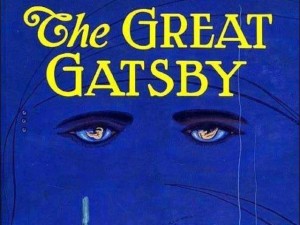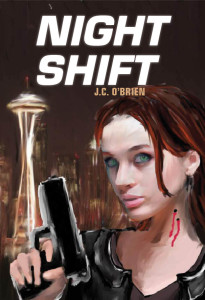I wrote my first short story at my grandmother’s kitchen table while she and my mother drank Cokes and talked family business. I was fifteen. My burnout boyfriend had dealt (and smoked) a little pot while I was in his friend’s car. At that time, I didn’t drink or smoke and since we were within three blocks of our high school I was freaked out. Honor students didn’t get busted for pot.
Instead of talking to him, I wrote a surrealist story that explained how I felt better than the “what the hell” that was running through my mind. I wrote longhand while my mom and grandmother chatted and I finished the thing in one sitting. I turned it in and my English teacher suggested I enter a local college’s writing contest. If I made it, I’d get to go to a writing workshop with other teens and maybe win a scholarship.
I got in. But instead of putting me with all the other short story writers, I ended up at drowningtable full of poets. The teens were cool. They put up with reading all the extra pages of my writing compared to the handful of poems they’d each submitted. The adult running the table was a published poet and he proved less helpful.
He fixated on a central image in the story and told me it was wrong, but explained that he didn’t know why. So I turned to the teens and asked them what they’d gotten out of the story. My feelings of drowning, struggling to swim — all seemed to have come across. So I shook my head at the poet and explained that I’d reached my audience. I hadn’t written the story for him. I’d written it for other teens and they had the exact reaction I was after — they got that it was about drugs and all they confusion and trying to fit in and fear that went with them (this was the ‘Just Say No’ era). He continued to disagree with me until the speaker started talking.
Oddly enough, I don’t clearly remember my boyfriend’s reaction to reading the story. A part of me wants to say that I tried to give it to him and he laughed it off, but I can’t be sure. What I do remember clearly is that poet sitting there in his three-piece suit shaking his head no while I was so certain I was right. Maybe I didn’t win the scholarship, but I walked away confident.
Or I thought I did.
I’ve never liked editing my own work. Give me someone else’s story and I’ll do my best to remain true to their vision, to tease out the lines of what’s there and ask questions so that the story remains the author’s, but ends up stronger than when it first landed in my hands.
I edit this way for other people because I have a deep respect for them and their stories. I feel it’s my place to help them find their own way, not grab their story and rework it until it’s mine.
I’m working on two large projects at the moment: a 600-plus YA novel that’s about to be beta-read by a teenager and a steampunk that’s given me troubles off and on for three years. I just realized that the editor in my head looks nothing like me. The editor in my head doesn’t even have a clear sense of how to tell me what he thinks is wrong.
And there it is.
The editor in my head is that male poet in his three-piece suit, leaning on the back of his chair, shaking his head no. And here I am trying to figure out how to politely thank him for his input and ask if he could kindly go find another member of the faculty. I don’t remember what any other teacher at that event looked like, so I’ll have to make someone up. Toni Morrison comes to mind, but frankly, I find her daunting. I’m not certain I can live up to her standards. So I’m going to pick someone I think would be more encouraging, but perhaps just as tough. Right now, I’m doing my best to get my cool, new editor to hang out with me. If you’re wondering what she looks like, she’s a bit like Stevie Nicks.
Yeah, the suit is still bleeding through, but this is new. I just created Editor Nicks in my mind. I need to give her some time to settle in.
fiction
Try a little empathy

Maybe it’s seeing people get all pissed because Hermione is going to be black. Or maybe it’s because I read a women’s lengthy response to being criticized for identifying with “Lolita.” Or maybe it’s Trump.
The thing is I have had it with being asked to view everything through white male eyes.
As an English major, I was trained to read canon, which means white, male, Anglo-Saxon literature. I learned to peer through the eyes of the (white, male) main characters and understand their thoughts, challenges and joys. Many of the female (white) characters were there for sex, whether they offered it freely or not. Anybody else was often just not there.
Over the years, I’ve been mistaken for Latina, Hawaiian, having black blood, Jewish, Egyptian and Black Irish. With those assumptions has come the expectation that I will read these white texts (books) in a specific way or that I’ll understand other texts from a whole different place. I’ve disappointed those people as well because I am not any one thing. I’m a mutt — a mix and regardless of everyone else’s designs on my provenance, there’s nothing I can do to change the body I was born with.
To tell the truth, being forced to spend my entire educational career analyzing the hearts and minds of those in power has proven useful. And a great deal of what’s out there is art, even if, say the protagonist became my next door neighbor, I’d be forced to turn him in for his criminal acts.
Art is where we can explore anything.
I still like that about art.
But I am really effing tired of reading about old white men and young white men and their desires. I’m tired of them being put forth by lists in Esquire as the best and most important bits of literature.
I read because I can be anyone or anything. I read to lead more than this one life, so, yeah, it’s been great to play at being a white dude, but I’m hungry for something else. I’m after an inclusive canon, where everything can be explored and there is no expectation that I have to match the protagonist’s skin tone or genitalia. But there is the possibility that every reader will, at one time or another, see someone who physically is like them in the position of hero and there is the requirement that others, who do not look anything like that hero, will be asked to look out through there eyes and see the world through a non-white gaze and open their effing hearts and minds so they can gain a little empathy.
The Not so Great Gatsby
I have a confession to make:
I don’t think “The Great Gatsby” is the Great American Novel. Despite the best efforts of brilliant readers like Nancy Pearl, I return to the reaction I had when I first read the story as a high school sophomore: There are some beautiful sentences in this book, but I don’t give a damn about the story.
Don’t get me wrong. It’s great piece of writing.
I can clock the moment my husband became interesting by the time he compared the description of Gatsby’s beautiful shirts to the rhythms of jazz. I believe that F. Scott Fitzgerald‘s final Gatsby sentences are some of the most brilliant in literature. And I know that the concerns of money, class and privilege remain dramatically relevant today.
But the mistress’s death feels contrived. Which leaves the rest of the book feeling contrived, but it meant that I got to spend a whole lot of time with a cool teacher while she explained it to me. This was my first introduction to literary criticism (Thank you, Mrs. Kercher).
In the last decade, Fitzgerald’s become something of a cult with whole books being written about Gatsby and his brilliance.
Let’s face it, Fitzgerald didn’t come up with his characters, witty dialogue and descriptions all on his own; he patterned some of the women after Zelda (his wife) and lifted sentences from her letters and diaries to prop up his own work.
I know. Artists steal. But at what cost?
Certainly, Fitzgerald found himself plotting fresh breakdowns for Zelda and cribbed passages from letters written from the insane asylum.
Whether or not Zelda would have been a great author on her own is something we can’t prove.
But here’s what I suspect:
I think the fact that Fitzgerald couldn’t do it on his own ate at his core. I believe it made him less of an artist, leaving him even more disempowered in the face of his own efforts. And I have to wonder what would have happened if he and his famous editor had opted for another course:
What if they had invited Zelda in? What if Zelda and F. Scott shared a byline, granting Zelda access to the fame she helped make possible? At the very least, isn’t that something readers could remember to do today?
Tease read: NIGHT SHIFT excerpt
As Seattle’s alpha werewolf, Ted Baron could control the transformation. He rolled his shirt up past his elbow and winced as the hair sprouted on his forearm.
The bones in his wrist thickened and the tips of his fingers split as his claws unsheathed.
He drew Manny close with his human hand. Ted smiled once, and before the warlock could utter word one of a spell, he slit the man from his neck to his pubic bone.
Manny’s entrails spilled onto the floor as he screamed. Ted turned around so that Manny wouldn’t see his nostrils twitch. Meat was still meat after all. Hard to leave a fresh meal to go to waste.
He turned back to see Manny writhing at the end of his human hand. Each scream forced his diaphragm in and out, pumping more blood onto the floor.
Ted stared into Manny’s eyes until Manny grew quiet. When the only sound was the gurgle of Manny’s exposed intestines, Ted brought the wolf hand before Manny’s eyes.
He forced his face into a grin so that Manny wouldn’t see the pain as Ted’s claws slid back into the flesh of his hand. His skin returned to a tanned white, while the dark hairs retracted, shortening slowly like a time elapsed film.
Ted stretched the now-human hand and all of his knuckles cracked. He reached into his pocket for his Blackberry, thumbing a few keys before bringing the device to his ear.
“I need you in the office,” he said. “Don’t tell me it’s late.” Both he and Manny glanced from the copy room through the glass wall of Benson’s office to see the moon rising above Mount Rainier. “I need you to take care of a mess.” He dropped Manny to the floor.
Manny’s legs tumbled awkwardly beneath him. His hands shook as he tried to gather up his entrails and push them back into his body.
“Trust me,” Ted said. “No one has ever figured out how to get them back in once I’ve let them out.” He leaned down and ran a finger over a glistening intestine. Again he held Manny’s gaze as he brought it to his mouth and licked his finger clean.
“Shame that I never learned to read this particular kind of oracle, but that was always your thing. Give it a good look, but remember, Manny,” he said, “whatever my pack consumes is mine. There’s no escape. Not even in death. Especially,” he said, “when I have this.”
Nearly covering Manny’s hand with his own, he pressed it to the floor. Only Manny’s right index finger remained clear. Manny muttered a few magical words that stopped in his throat when Ted yanked the finger off at the root.
He pulled a monogrammed handkerchief from his pocket and wrapped the index finger like a package, then returned it to his pocket. He also pocketed the vial of Manny’s blood he’d forcibly collected when the warlock had arrived.
Ted checked his Rolex. “You have about five more minutes to make an attempt at peace before the cleanup crew arrives. Best of luck, Manny.” He ruffled the man’s hair and turned to walk out. One hand jangled the change in his pocket, the other he held at Manny’s eye level while he allowed just the tips of his claws to peek out.
“I just can’t leave without one more taste,” he said as he scraped the claws across Manny’s right cheek, leaving four deep lines of blood.
Manny could hear Ted sucking his nails clean as he walked down the hall.
He waited until he heard the office door click shut and imagined the elevator had arrived to take Ted down into the parking garage to his awaiting vintage Porsche.
Manny shoved his hand under his intestines, looking for the cell phone in his pocket. The pain had overridden his mind to where he could no longer tell the difference between his insides and his outsides. He had to push and dig until he finally managed to retrieve the phone.
When he looked down, he saw it was covered with blood and feces. His sister Margaret would only argue the last breath out of him. He turned his head and pressed four with his thumb to speed dial his niece Cassie while vomiting.
“If this is your idea of a prank call, Uncle Manny,” she said, “You ought to block your number.”
“Ted,” Manny said.
“Who’s dead? I’m at the Alibi and we’ve got a crappy connection. You know how it is at the Market.”
“T,” Manny said.
“Now I’m getting alphabet lectures,” she said.
He gave up on identifying his killer and settled for action. “Protect yourself,” Manny said.
“Quit trying to scare me into making up with Mother. You know she only uses mild spells against family.”
“There’s magic in your blood.” Manny shuddered with effort while he inhaled.
“So she says.”
This was taking too long. The wolf’s cleanup crew was coming. He had to warn her. “If you don’t use your magic,” he said, “someone else will.”
“Are you drunk, Uncle Manny? Tell me what’s really going on. . .”
But all she heard on the other end of the line was Manny’s scream and a wolflike snarl. Then the line went dead.
***
When dialing Manny delivered nothing but voicemail, Cassie did what every fresh cop would do. She dialed the precinct and argued her way up the food chain until she got Sergeant Mortenson on the phone.
“We’ll file a missing persons report when he’s reported missing, Hunt.”
“But the scream. The line going dead. We know something bad has happened.”
“You think you know something, officer, but I know Manny Shay. I’m not banking taxpayer money against a rookie hunch — you’re your uncle’s niece as much as you’re your father’s daughter.”
One of her mother’s spells bubbled into Cassie’s mind. She stamped out the thought. “I earned my way onto the force.”
“Believe what you want. As far as I’m concerned, the thing you have to earn is your right to remain.”
“It’s not like you’ve got candidates lined up outside your door.”
“No, but a bad cop is a luxury I can’t afford. Don’t prove pricey, Hunt.”
The phone went dead.
Cassie dug a crumpled twenty out of her jeans pocket. She dropped it on the bar beside her full shot of bourbon.
“That leaves us more than even.”
Kat, the bartender and owner, didn’t even turn around.
“Let Nick know that he’s too late — again,” she said.
Kat punched a key on the cash register. The drawer opened. Her left hand swept up the twenty, smoothed it and settled it sweetly in the drawer.
“I charge extra for messages.”
“And that large bill just delivered it.”
Cassie tried to grab her jacket and purse with one hand while dialing Nick with the other. She refused to enter him in speed dial. Besides, his number burned in her memory.
She bumped the door open with her hip. The door swung just wide enough to catch Nick Myers chin. His head jerked back to keep her from getting his precious nose. Being a big, bad werewolf kept him from going down, but it was Cassie who did the growling.
“You were supposed to be here an hour ago.”
“Business.”
“What’s her name? I can run her in.” Cassie jabbed her purse at Nick’s chest. He grabbed it reflexively, knowing enough not to try to help her on with her coat.
“Manny’s got trouble and Mortenson refuses to help fix it.”
“And that’s news?” He smoothed the straps on her bag before returning them to her waiting hand.
Cassie snapped up the purse and stalked ahead of him six paces before spinning around.
“One of your low-life connections knows how to do a trace, right?”
“You mean an illegal trace of someone’s cell phone?” Nick shook his head and opened his arms wide. “I don’t know a thing about illegal activities.” He crossed his arms across his chest and winked, “But I do have a new friend who’s handy with computers. I’ll introduce you.”

